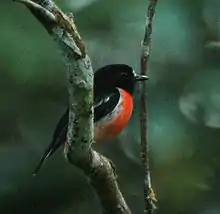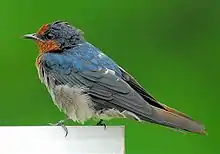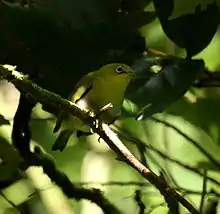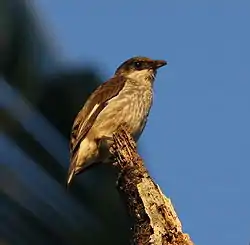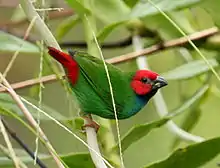List of birds of Fiji
The avifauna of Fiji is the richest in West Polynesia. Numerous families reach the farthest east of their range, and the island is home to several endemic species and genera, as well as sharing several more endemics with its close neighbours Tonga and Samoa.
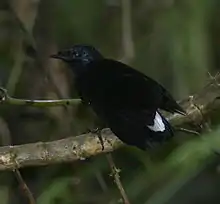
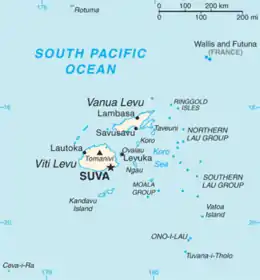
The birds of Fiji have been heavily impacted by the arrival of humans. Several species (and some genera) were lost in prehistory and are known only from fossil remains. Other have become extinct more recently, and some species remain very close to extinction. It is certain that the current knowledge of the previous ranges of many species is incomplete and further research is needed.
This is a list of the bird species recorded in Fiji. The avifauna of Fiji include a total of 178 species, of which 31 are endemic, and 13 have been introduced by humans. Numerous species listed have been extirpated from Fiji.
This list's taxonomic treatment (designation and sequence of orders, families and species) and nomenclature (common and scientific names) follow the conventions of The Clements Checklist of Birds of the World, 2019 edition. The family accounts at the beginning of each heading reflect this taxonomy, as do the species counts found in each family account. Introduced and accidental species are included in the total counts for Fiji. There are also a few species listed that have been recorded in Fiji, but not known to what specific island they were recorded at.
The following tags have been used to highlight several categories.
- (V) Vagrant - a species that rarely or accidentally occurs in Fiji
- (B) Breeder - a species that breeds in Fiji
- (M) Migrant - a species that regularly migrates to Fiji
- (P) Passage migrant - a species that neither breeds nor winters in Fiji but regularly passes through
- (I) Introduced - a species introduced to Fiji as a consequence, direct or indirect, of human actions
- (X) Extirpated - a species that no longer occurs here although populations may exist elsewhere
- (*) Endemic - a species that is endemic to Fiji
- (?) Uncertain - a species with uncertain records or current status
Ducks, geese, and waterfowl
Order: Anseriformes Family: Anatidae
Anatidae includes the ducks and most duck-like waterfowl, such as geese and swans. These birds are adapted to an aquatic existence with webbed feet, flattened bills, and feathers that are excellent at shedding water due to an oily coating.
| Species | Viti Levu | Vanua Levu | Taveuni | Kadavu | Lomaiviti | Lau | Rotuma | |
|---|---|---|---|---|---|---|---|---|
| Wandering whistling-duck Dendrocygna arcuata |
X | |||||||
| Pacific black duck Anas superciliosa |
B | B | B | B | B | |||
| Eastern spot-billed duck Anas zonorhyncha |
||||||||
| Mallard Anas platyrhynchos |
V | |||||||
Megapodes
Order: Galliformes Family: Megapodiidae
The Megapodiidae are stocky, medium-large chicken-like birds with small heads and large feet. All but the malleefowl occupy jungle habitats and most have brown or black colouring.
| Species | Viti Levu | Vanua Levu | Taveuni | Kadavu | Lomaiviti | Lau | Rotuma |
|---|---|---|---|---|---|---|---|
| Consumed scrubfowl Megapodius alimentum |
X | ||||||
| Viti Levu scrubfowl Megapodius amissus * |
X | X | |||||
| Melanesian scrubfowl Megapodius eremita |
Sylviornithids
Pangalliformes Family: Sylviornithidae
Sylviornithids are an extinct lineage of flightless birds related to modern Galliformes. They are represented by two species, one of them native to Fiji.
| Species | Viti Levu | Vanua Levu | Taveuni | Kadavu | Lomaiviti | Lau | Rotuma |
|---|---|---|---|---|---|---|---|
| Noble megapode Megavitiornis altirostris |
X |
Pheasants, grouse, and allies
Order: Galliformes Family: Phasianidae
The Phasianidae are a family of terrestrial birds. In general, they are plump (although they vary in size) and have broad, relatively short wings.
| Species | Viti Levu | Vanua Levu | Taveuni | Kadavu | Lomaiviti | Lau | Rotuma | |
|---|---|---|---|---|---|---|---|---|
| Brown quail Synoicus ypsilophorus |
I | I | ||||||
| Red junglefowl Gallus gallus |
IX | IX | I | I | I | I | I | |
| Wild turkey Meleagris gallopavo |
I | |||||||
Pigeons and doves
Order: Columbiformes Family: Columbidae
Pigeons and doves are stout-bodied birds with short necks and short slender bills with a fleshy cere.
| Species | Viti Levu | Vanua Levu | Taveuni | Kadavu | Lomaiviti | Lau | Rotuma |
|---|---|---|---|---|---|---|---|
| Rock dove Columba livia |
I | I | I | ||||
| Metallic pigeon Columba vitiensis |
B | B | B | B | B | B | |
| Spotted dove Spilopelia chinensis |
I | I | I | I | |||
| Shy ground dove Alopecoenas stairi |
B | B | B | B | B | B | |
| Many-colored fruit-dove Ptilinopus perousii |
B | B | B | B | B | B | |
| Crimson-crowned fruit dove Ptilinopus porphyraceus |
B | B | |||||
| Orange dove Ptilinopus victor* |
B | B | |||||
| Golden dove Ptilinopus luteovirens* |
B | B | |||||
| Velvet dove Ptilinopus layardi* |
B | ||||||
| Pacific imperial-pigeon Ducula pacifica |
B | B | B | ||||
| Peale's imperial-pigeon Ducula latrans* |
B | B | B | B | B | B | |
| Lau imperial-pigeon Ducula lakeba |
X | X | |||||
| Viti Levu giant pigeon Natunaornis gigoura* |
X |
Cuckoos
Order: Cuculiformes Family: Cuculidae
The family Cuculidae includes cuckoos, roadrunners and anis. These birds are of variable size with slender bodies, long tails and strong legs. The Old World cuckoos are brood parasites.
| Species | Viti Levu | Vana Levu | Taveuni | Kadavu | Lomaiviti | Lau | Rotuma |
|---|---|---|---|---|---|---|---|
| Long-tailed koel Urodynamis taitensis |
M | M | M | M | M | M | |
| Fan-tailed cuckoo Cacomantis flabelliformis |
B | B | B | B | B |
Frogmouths
Order: Caprimulgiformes Family: Podargidae
The frogmouths are a group of nocturnal birds related to the nightjars. They are named for their large flattened hooked bill and huge frog-like gape, which they use to take insects.
| Species | Viti Levu | Vana Levu | Taveuni | Kadavu | Lomaiviti | Lau | Rotuma | |
|---|---|---|---|---|---|---|---|---|
| Tawny frogmouth Podargus strigoides |
I | |||||||
Swifts
Order: Caprimulgiformes Family: Apodidae
Swifts are small birds which spend the majority of their lives flying. These birds have very short legs and never settle voluntarily on the ground, perching instead only on vertical surfaces. Many swifts have long swept-back wings which resemble a crescent or boomerang.
| Species | Viti Levu | Vana Levu | Taveuni | Kadavu | Lomaiviti | Lau | Rotuma | |
|---|---|---|---|---|---|---|---|---|
| White-throated needletail Hirundapus caudacutus |
V | |||||||
| White-rumped swiftlet Aerodramus spodiopygius |
B | B | B | B | B | B | ||
| Australian swiftlet Aerodramus terraereginae |
||||||||
Rails, gallinules, and coots
Order: Gruiformes Family: Rallidae
Rallidae is a large family of small to medium-sized birds which includes the rails, crakes, coots and gallinules. Typically they inhabit dense vegetation in damp environments near lakes, swamps or rivers. In general they are shy and secretive birds, making them difficult to observe. Most species have strong legs and long toes which are well adapted to soft uneven surfaces. They tend to have short, rounded wings and to be weak fliers.
| Species | Viti Levu | Vanua Levu | Taveuni | Kadavu | Lomaiviti | Lau | Rotuma |
|---|---|---|---|---|---|---|---|
| Buff-banded rail Gallirallus philippensis |
X | X | B | B | B | B | B |
| Bar-winged rail Gallirallus poecilopterus* |
|||||||
| Black-backed swamphen Porphyrio indicus |
|||||||
| Australasian swamphen Porphyrio melanotus |
X | X | B | B | B | B | B |
| Viti Levu rail Vitirallus watlingi* |
X | ||||||
| White-browed crake Amaurornis cinerea |
B | B | B | B | B | B | |
| Spotless crake Zapornia tabuensis |
B | B | B | B | B | B |
Plovers and lapwings
Order: Charadriiformes Family: Charadriidae
The family Charadriidae includes the plovers, dotterels and lapwings. They are small to medium-sized birds with compact bodies, short, thick necks and long, usually pointed, wings. They are found in open country worldwide, mostly in habitats near water.
| Species | Viti Levu | Vanua Levu | Taveuni | Kadavu | Lomaiviti | Lau | Rotuma | |
|---|---|---|---|---|---|---|---|---|
| Black-bellied plover Pluvialis squatarola |
V | |||||||
| Pacific golden-plover Pluvialis fulva |
M | M | M | M | M | M | M | |
| Masked lapwing Vanellus miles |
V | |||||||
| Lesser sand-plover Charadrius mongolus |
V | |||||||
| Caspian plover Charadrius asiaticus |
V | |||||||
| Double-banded plover Charadrius bicinctus |
V | |||||||
Sandpipers and allies
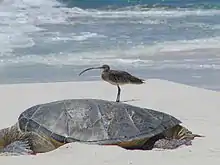
Order: Charadriiformes Family: Scolopacidae
Scolopacidae is a large diverse family of small to medium-sized shorebirds including the sandpipers, curlews, godwits, shanks, tattlers, woodcocks, snipes, dowitchers and phalaropes. The majority of these species eat small invertebrates picked out of the mud or soil. Variation in length of legs and bills enables multiple species to feed in the same habitat, particularly on the coast, without direct competition for food.
| Species | Viti Levu | Vanua Levu | Taveuni | Kadavu | Lomaiviti | Lau | Rotuma | |
|---|---|---|---|---|---|---|---|---|
| Bristle-thighed curlew Numenius tahitiensis |
M | M | M | M | M | M | M | |
| Whimbrel Numenius phaeopus |
M | M | M | M | M | M | M | |
| Far Eastern curlew Numenius madagascariensis |
V | |||||||
| Bar-tailed godwit Limosa lapponica |
M | M | M | M | M | M | M | |
| Hudsonian godwit Limosa haemastica |
V | |||||||
| Ruddy turnstone Arenaria interpres |
M | M | M | M | M | M | M | |
| Red knot Calidris canutus |
V | |||||||
| Ruff Calidris pugnax |
V | |||||||
| Sharp-tailed sandpiper Calidris acuminata |
||||||||
| Curlew sandpiper Calidris ferruginea |
V | |||||||
| Red-necked stint Calidris ruficollis |
V | |||||||
| Sanderling Calidris alba |
||||||||
| Pectoral sandpiper Calidris melanotos |
V | |||||||
| Terek sandpiper Xenus cinereus |
V | |||||||
| Common sandpiper Actitis hypoleucos |
V | |||||||
| Solitary sandpiper Tringa solitaria |
V | |||||||
| Gray-tailed tattler Tringa brevipes |
M | M | M | M | M | M | M | |
| Wandering tattler Tringa incana |
M | M | M | M | M | M | M | |
| Lesser yellowlegs Tringa flavipes |
V | |||||||
| Viti Levu snipe Coenocorypha miratropica* |
X | |||||||
Skuas and jaegers
Order: Charadriiformes Family: Stercorariidae
The family Stercorariidae are, in general, medium to large birds, typically with grey or brown plumage, often with white markings on the wings. They nest on the ground in temperate and arctic regions and are long-distance migrants.
| Species | Viti Levu | Vana Levu | Taveuni | Kadavu | Lomaiviti | Lau | Rotuma | |
|---|---|---|---|---|---|---|---|---|
| South polar skua Stercorarius maccormicki |
V | |||||||
| Pomarine jaeger Stercorarius pomarinus |
V | |||||||
| Parasitic jaeger Stercorarius parasiticus |
V | |||||||
| Long-tailed jaeger Stercorarius longicaudus |
V | |||||||
Gulls, terns, and skimmers
Order: Charadriiformes Family: Laridae
Laridae is a family of medium to large seabirds, the gulls, terns, and skimmers. Gulls are typically grey or white, often with black markings on the head or wings. They have stout, longish bills and webbed feet. Terns are a group of generally medium to large seabirds typically with grey or white plumage, often with black markings on the head. Most terns hunt fish by diving but some pick insects off the surface of fresh water. Terns are generally long-lived birds, with several species known to live in excess of 30 years.
| Species | Viti Levu | Vana Levu | Taveuni | Kadavu | Lomaiviti | Lau | Rotuma | |
|---|---|---|---|---|---|---|---|---|
| Silver gull Chroicocephalus novaehollandiae |
V | |||||||
| Laughing gull Leucophaeus atricilla |
V | |||||||
| Kelp gull Larus dominicanus |
V | |||||||
| Brown noddy Anous stolidus |
B | B | B | B | B | B | B | |
| Black noddy Anous minutus |
B | B | B | B | B | B | B | |
| Blue-gray noddy Anous ceruleus |
B | B | B | B | B | B | B | |
| White tern Gygis alba |
B | B | B | B | B | B | B | |
| Sooty tern Onychoprion fuscatus |
B | B | B | B | B | B | B | |
| Gray-backed tern Onychoprion lunatus |
||||||||
| Bridled tern Onychoprion anaethetus |
||||||||
| Little tern Sternula albifrons |
V | |||||||
| White-winged tern Chlidonias leucopterus |
V | |||||||
| Black-naped tern Sterna sumatrana |
B | B | B | B | B | B | ||
| Common tern Sterna hirundo |
P | P | P | P | P | |||
| Great crested tern Thalasseus bergii |
B | B | B | B | B | B | B | |
Tropicbirds
Order: Phaethontiformes Family: Phaethontidae
Tropicbirds are slender white birds of tropical oceans, with exceptionally long central tail feathers. Their heads and long wings have black markings.
| Species | Viti Levu | Vanua Levu | Taveuni | Kadavu | Lomaiviti | Lau | Rotuma |
|---|---|---|---|---|---|---|---|
| White-tailed tropicbird Phaethon lepturus |
B | B | B | B | B | B | B |
| Red-tailed tropicbird Phaethon rubricauda |
B | B | B | B | B | B | B |
Albatrosses
Order: Procellariiformes Family: Diomedeidae
The albatrosses are among the largest of flying birds, and the great albatrosses from the genus Diomedea have the largest wingspans of any extant birds.
| Species | Viti Levu | Vanua Levu | Taveuni | Kadavu | Lomaiviti | Lau | Rotuma | |
|---|---|---|---|---|---|---|---|---|
| Black-browed albatross Thalassarche melanophris |
V | |||||||
| Wandering albatross Diomedea exulans |
||||||||
Southern storm-petrels
Order: Procellariiformes Family: Oceanitidae
The southern storm-petrels are relatives of the petrels and are the smallest seabirds. They feed on planktonic crustaceans and small fish picked from the surface, typically while hovering. The flight is fluttering and sometimes bat-like.
| Species | Viti Levu | Vanua Levu | Taveuni | Kadavu | Lomaiviti | Lau | Rotuma | |
|---|---|---|---|---|---|---|---|---|
| Wilson's storm-petrel Oceanites oceanicus |
P | |||||||
| White-faced storm-petrel Pelagodroma marina |
V | |||||||
| White-bellied storm-petrel Fregetta grallaria |
V | |||||||
| New Zealand storm-petrel Fregetta maoriana |
V | |||||||
| Black-bellied storm-petrel Fregetta tropica |
V | |||||||
| Polynesian storm-petrel Nesofregatta fuliginosa |
B | B | B | B | B | |||
Northern storm-petrels
Order: Procellariiformes Family: Hydrobatidae
Though the members of this family are similar in many respects to the southern storm-petrels, including their general appearance and habits, there are enough genetic differences to warrant their placement in a separate family.
| Species | Viti Levu | Vanua Levu | Taveuni | Kadavu | Lomaiviti | Lau | Rotuma | |
|---|---|---|---|---|---|---|---|---|
| Leach's storm-petrel Oceanodroma leucorhoa |
V | |||||||
| Matsudaira's storm-petrel Oceanodroma matsudairae |
V | |||||||
Shearwaters and petrels
Order: Procellariiformes Family: Procellariidae
The procellariids are the main group of medium-sized "true petrels", characterised by united nostrils with medium septum and a long outer functional primary.
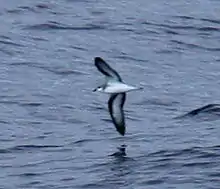
| Species | Viti Levu | Vanua Levu | Taveuni | Kadavu | Lomaiviti | Lau | Rotuma | |
|---|---|---|---|---|---|---|---|---|
| Southern giant-petrel Macronectes giganteus |
V | |||||||
| Cape petrel Daption capense |
V | |||||||
| Gray-faced petrel Pterodroma gouldi |
||||||||
| Kermadec petrel Pterodroma neglecta |
V | |||||||
| Herald petrel Pterodroma heraldica |
V | |||||||
| Murphy's petrel Pterodroma ultima |
V | |||||||
| Providence petrel Pterodroma solandri |
V | |||||||
| Mottled petrel Pterodroma inexpectata |
P | |||||||
| White-necked petrel Pterodroma cervicalis |
||||||||
| Black-winged petrel Pterodroma nigripennis |
||||||||
| Gould's petrel Pterodroma leucoptera |
V | |||||||
| Collared petrel Pterodroma brevipes |
B | B | B | B | B | B | ||
| Phoenix petrel Pterodroma alba |
V | |||||||
| Fiji petrel Pseudobulweria macgillivrayi* |
B | |||||||
| Tahiti petrel Pseudobulweria rostrata |
B | B | ||||||
| Parkinson's petrel Procellaria parkinsoni |
V | |||||||
| Flesh-footed shearwater Ardenna carneipes |
V | |||||||
| Wedge-tailed shearwater Ardenna pacifica |
B | B | B | B | B | B | B | |
| Buller's shearwater Ardenna bulleri |
V | |||||||
| Sooty shearwater Ardenna grisea |
V | |||||||
| Short-tailed shearwater Ardenna tenuirostris |
V | |||||||
| Christmas shearwater Puffinus nativitatis |
V | |||||||
| Newell's shearwater Puffinus newelli |
||||||||
| Tropical shearwater Puffinus bailloni |
B | B | B | B | B | B | ||
Frigatebirds
Order: Suliformes Family: Fregatidae
Frigatebirds are large seabirds usually found over tropical oceans. They are large, black-and-white or completely black, with long wings and deeply forked tails. The males have coloured inflatable throat pouches. They do not swim or walk and cannot take off from a flat surface. Having the largest wingspan-to-body-weight ratio of any bird, they are essentially aerial, able to stay aloft for more than a week.
| Species | Viti Levu | Vanua Levu | Taveuni | Kadavu | Lomaiviti | Lau | Rotuma |
|---|---|---|---|---|---|---|---|
| Lesser frigatebird Fregata ariel |
B | B | B | B | B | B | B |
| Great frigatebird Fregata minor |
R | R | R | R | R | R | R |
Boobies and gannets
Order: Suliformes Family: Sulidae
The sulids comprise the gannets and boobies. Both groups are medium to large coastal seabirds that plunge-dive for fish.
| Species | Viti Levu | Vanua Levu | Taveuni | Kadavu | Lomaiviti | Lau | Rotuma |
|---|---|---|---|---|---|---|---|
| Masked booby Sula dactylatra |
B | B | B | B | B | B | B |
| Brown booby Sula leucogaster |
B | B | B | B | B | B | B |
| Red-footed booby Sula sula |
B | B | B | B | B | B | B |
Pelicans
Order: Pelecaniformes Family: Pelecanidae
Pelicans are large water birds with a distinctive pouch under their beak. As with other members of the order Pelecaniformes, they have webbed feet with four toes.
| Species | Viti Levu | Vanua Levu | Taveuni | Kadavu | Lomaiviti | Lau | Rotuma | |
|---|---|---|---|---|---|---|---|---|
| Australian pelican Pelecanus conspicillatus |
V | |||||||
Herons, egrets, and bitterns
Order: Pelecaniformes Family: Ardeidae
The family Ardeidae contains the bitterns, herons and egrets. Herons and egrets are medium to large wading birds with long necks and legs. Bitterns tend to be shorter necked and more wary. Members of Ardeidae fly with their necks retracted, unlike other long-necked birds such as storks, ibises and spoonbills.
| Species | Viti Levu | Vanua Levu | Taveuni | Kadavu | Lomaiviti | Lau | Rotuma | |
|---|---|---|---|---|---|---|---|---|
| Great egret Ardea alba |
V | |||||||
| White-faced heron Egretta novaehollandiae |
B? | |||||||
| Pacific reef-egret Egretta sacra |
B | B | B | B | B | B | B | |
| Cattle egret Bubulcus ibis |
V | |||||||
| Striated heron Butorides striata |
B | B | B | B | B | B | ||
Ibises and spoonbills
Order: Pelecaniformes Family: Threskiornithidae
Threskiornithidae is a family of large terrestrial and wading birds which includes the ibises and spoonbills. They have long, broad wings with 11 primary and about 20 secondary feathers. They are strong fliers and despite their size and weight, very capable soarers.
| Species | Viti Levu | Vanua Levu | Taveuni | Kadavu | Lomaiviti | Lau | Rotuma | |
|---|---|---|---|---|---|---|---|---|
| Glossy ibis Plegadis falcinellus |
V | |||||||
Hawks, eagles, and kites
Order: Accipitriformes Family: Accipitridae
Accipitridae is a family of birds of prey, which includes hawks, eagles, kites, harriers and Old World vultures. These birds have powerful hooked beaks for tearing flesh from their prey, strong legs, powerful talons and keen eyesight.
| Species | Viti Levu | Vanua Levu | Taveuni | Kadavu | Lomaiviti | Lau | Rotuma |
|---|---|---|---|---|---|---|---|
| Swamp harrier Circus approximans |
B | B | B | B | B | B | |
| Fiji goshawk Accipiter rufitorques* | B | B | B | B | B |
Barn-owls
Order: Strigiformes Family: Tytonidae
Barn owls are medium to large owls with large heads and characteristic heart-shaped faces. They have long strong legs with powerful talons. There are 16 species worldwide and 2 species which occur in Fiji.
| Species | Viti Levu | Vana Levu | Taveuni | Kadavu | Lomaiviti | Lau | Rotuma |
|---|---|---|---|---|---|---|---|
| Australasian grass-owl Tyto longimembris |
X | ||||||
| Barn owl Tyto alba |
B | B | B | B | B | B |
Kingfishers
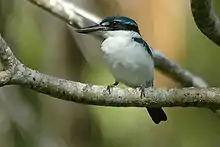
Order: Coraciiformes Family: Alcedinidae
Kingfishers are medium-sized birds with large heads, long, pointed bills, short legs and stubby tails.
| Species | Viti Levu | Vana Levu | Taveuni | Kadavu | Lomaiviti | Lau | Rotuma |
|---|---|---|---|---|---|---|---|
| Pacific kingfisher Todirhamphus sacer[1] |
B | B | B | B | B | B | |
| Sacred kingfisher Todirhamphus sanctus |
Falcons
Order: Falconiformes Family: Falconidae
Falconidae is a family of diurnal birds of prey. They differ from hawks, eagles and kites in that they kill with their beaks instead of their talons.
| Species | Viti Levu | Vanua Levu | Taveuni | Kadavu | Lomaiviti | Lau | Rotuma |
|---|---|---|---|---|---|---|---|
| Peregrine falcon Falco peregrinus |
B | B | B | B | B |
Old World parrots
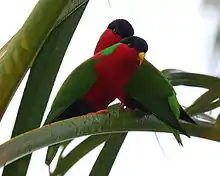
Order: Psittaciformes Family: Psittaculidae
Characteristic features of parrots include a strong curved bill, an upright stance, strong legs, and clawed zygodactyl feet. Many parrots are vividly coloured, and some are multi-coloured. In size they range from 8 cm (3.1 in) to 1 m (3.3 ft) in length. Old World parrots are found from Africa east across south and southeast Asia and Oceania to Australia and New Zealand.
| Species | Viti Levu | Vana Levu | Taveuni | Kadavu | Lomaiviti | Lau | Rotuma |
|---|---|---|---|---|---|---|---|
| Crimson shining-parrot Prosopeia splendens*[2] |
I | B | |||||
| Red shining-parrot Prosopeia tabuensis*[3] |
B | B | |||||
| Masked shining-parrot Prosopeia personata* |
B | ||||||
| Red-throated lorikeet Charmosyna amabilis* |
B? | B? | B? | X | |||
| Collared lory Phigys solitarius* |
B | B | B | B | B | B | |
| Blue-crowned lorikeet Vini australis |
B |
Honeyeaters
Order: Passeriformes Family: Meliphagidae
The honeyeaters are a large and diverse family of small to medium-sized birds most common in Australia and New Guinea. They are nectar feeders and closely resemble other nectar-feeding passerines.
| Species | Viti Levu | Vana Levu | Taveuni | Kadavu | Lomaiviti | Lau | Rotuma |
|---|---|---|---|---|---|---|---|
| Rotuma myzomela Myzomela chermesina* |
B | ||||||
| Orange-breasted myzomela Myzomela jugularis* |
B | B | B | B | B | B | |
| Kadavu honeyeater Meliphacator provocator* |
B | ||||||
| Chattering giant-honeyeater Gymnomyza viridis* |
B | B | |||||
| Duetting giant-honeyeater Gymnomyza brunneirostris* |
B | ||||||
| Western wattled-honeyeater Foulehaio procerior |
B | ||||||
| Eastern wattled-honeyeater Foulehaio carunculatus |
B | B | B | B | |||
| Northern wattled-honeyeater Foulehaio taviunensis* |
B | B |
Cuckooshrikes
Order: Passeriformes Family: Campephagidae
The cuckooshrikes are small to medium-sized passerine birds. They are predominantly greyish with white and black, although some species are brightly coloured.
| Species | Viti Levu | Vana Levu | Taveuni | Kadavu | Lomaiviti | Lau | Rotuma |
|---|---|---|---|---|---|---|---|
| Polynesian triller Lalage maculosa |
B | B | B | B | B | B | B |
Whistlers and allies
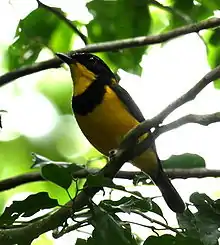
Order: Passeriformes Family: Pachycephalidae
The family Pachycephalidae includes the whistlers, shrike-thrushes, shrike-tits, pitohuis and crested bellbird.
| Species | Viti Levu | Vana Levu | Taveuni | Kadavu | Lomaiviti | Lau | Rotuma |
|---|---|---|---|---|---|---|---|
| Fiji whistler Pachycephala vitiensis* |
B | B | B | B | B | B |
Woodswallows, bellmagpies, and allies
Order: Passeriformes Family: Artamidae
The woodswallows are soft-plumaged, somber-coloured passerine birds. They are smooth, agile flyers with moderately large, semi-triangular wings. The cracticids: currawongs, bellmagpies and butcherbirds, are similar to the other corvids. They have large, straight bills and mostly black, white or grey plumage. All are omnivorous to some degree.
| Species | Viti Levu | Vana Levu | Taveuni | Kadavu | Lomaiviti | Lau | Rotuma |
|---|---|---|---|---|---|---|---|
| Fiji woodswallow Artamus mentalis* |
B | B | B | B | |||
| Australian magpie Gymnorhina tibicen |
I |
Fantails
Order: Passeriformes Family: Rhipiduridae
The fantails are small insectivorous birds which are specialist aerial feeders.
| Species | Viti Levu | Vana Levu | Taveuni | Kadavu | Lomaiviti | Lau | Rotuma |
|---|---|---|---|---|---|---|---|
| Taveuni silktail Lamprolia victoriae* |
B | ||||||
| Natewa silktail Lamprolia klinesmithi* |
B | ||||||
| Streaked fantail Rhipidura verreauxi |
B | B | B | B | |||
| Kadavu fantail Rhipidura personata* |
B |
Monarch flycatchers
Order: Passeriformes Family: Monarchidae
The monarch flycatchers are small to medium-sized insectivorous passerines which hunt by flycatching.
| Species | Viti Levu | Vana Levu | Taveuni | Kadavu | Lomaiviti | Lau | Rotuma |
|---|---|---|---|---|---|---|---|
| Ogea monarch Mayrornis versicolor* |
B | ||||||
| Slaty monarch Mayrornis lessoni* |
B | B | B | B | B | B | |
| Fiji shrikebill Clytorhynchus vitiensis |
B | B | B | B | B | B | B |
| Black-throated shrikebill Clytorhynchus nigrogularis |
B | B | B | B | B | ||
| Vanikoro flycatcher Myiagra vanikorensis |
B | B | B | B | B | B | |
| Azure-crested flycatcher Myiagra azureocapilla* |
B | ||||||
| Chestnut-throated flycatcher Myiagra castaneigularis* |
B | B |
Australasian robins
Order: Passeriformes Family: Petroicidae
Most species of Petroicidae have a stocky build with a large rounded head, a short straight bill and rounded wingtips. They occupy a wide range of wooded habitats, from subalpine to tropical rainforest, and mangrove swamp to semi-arid scrubland. All are primarily insectivores, although a few supplement their diet with seeds.
| Species | Viti Levu | Vana Levu | Taveuni | Kadavu | Lomaiviti | Lau | Rotuma |
|---|---|---|---|---|---|---|---|
| Pacific robin Petroica pusilla |
B | B | B | B |
Grassbirds and allies
Order: Passeriformes Family: Locustellidae
Locustellidae are a family of small insectivorous songbirds found mainly in Eurasia, Africa, and the Australian region. They are smallish birds with tails that are usually long and pointed, and tend to be drab brownish or buffy all over.
| Species | Viti Levu | Vana Levu | Taveuni | Kadavu | Lomaiviti | Lau | Rotuma |
|---|---|---|---|---|---|---|---|
| Long-legged thicketbird Trichocichla rufa* |
B | B |
Swallows
Order: Passeriformes Family: Hirundinidae
The family Hirundinidae is adapted to aerial feeding. They have a slender streamlined body, long pointed wings and a short bill with a wide gape. The feet are adapted to perching rather than walking, and the front toes are partially joined at the base.
| Species | Viti Levu | Vana Levu | Taveuni | Kadavu | Gau | Ovalau | Lau | Rotuma |
|---|---|---|---|---|---|---|---|---|
| Pacific swallow Hirundo tahitica |
B | B | B | B | B | B | B |
Bulbuls
Order: Passeriformes Family: Pycnonotidae
Bulbuls are medium-sized songbirds. Some are colourful with yellow, red or orange vents, cheeks, throats or supercilia, but most are drab, with uniform olive-brown to black plumage. Some species have distinct crests.
| Species | Viti Levu | Vana Levu | Taveuni | Kadavu | Lomaiviti | Lau | Rotuma |
|---|---|---|---|---|---|---|---|
| Red-vented bulbul Pycnonotus cafer |
I | I |
Bush warblers and allies
Order: Passeriformes Family: Scotocercidae
The members of this family are found throughout Africa, Asia, and Polynesia. Their taxonomy is in flux, and some authorities place some genera in other families.[4]
| Species | Viti Levu | Vana Levu | Taveuni | Kadavu | Lomaiviti | Lau | Rotuma |
|---|---|---|---|---|---|---|---|
| Fiji bush warbler Horornis ruficapilla* |
B | B | B | B |
White-eyes, yuhinas, and allies
Order: Passeriformes Family: Zosteropidae
The white-eyes are small and mostly undistinguished, their plumage above being generally some dull colour like greenish-olive, but some species have a white or bright yellow throat, breast or lower parts, and several have buff flanks. As their name suggests, many species have a white ring around each eye.
| Species | Viti Levu | Vana Levu | Taveuni | Kadavu | Lomaiviti | Lau | Rotuma |
|---|---|---|---|---|---|---|---|
| Layard's white-eye Zosterops explorator* |
B | B | B | B | B | ||
| Silvereye Zosterops lateralis |
B | B | B | B | B | ||
| Yellow-fronted white-eye Zosterops flavifrons |
Starlings
Order: Passeriformes Family: Sturnidae
Starlings are small to medium-sized passerine birds. Their flight is strong and direct and they are very gregarious. Their preferred habitat is fairly open country. They eat insects and fruit. Plumage is typically dark with a metallic sheen.
| Species | Viti Levu | Vana Levu | Taveuni | Kadavu | Lomaiviti | Lau | Rotuma |
|---|---|---|---|---|---|---|---|
| Polynesian starling Aplonis tabuensis |
B | B | B | B | B | B | B |
| European starling Sturnus vulgaris |
I | ||||||
| Common myna Acridotheres tristis |
I | I | I | I | I | ||
| Jungle myna Acridotheres fuscus |
I |
Thrushes and allies
Order: Passeriformes Family: Turdidae
The thrushes are a group of passerine birds that occur mainly in the Old World. They are plump, soft plumaged, small to medium-sized insectivores or sometimes omnivores, often feeding on the ground. Many have attractive songs.
| Species | Viti Levu | Vana Levu | Taveuni | Kadavu | Lomaiviti | Lau | Rotuma |
|---|---|---|---|---|---|---|---|
| Island thrush Turdus poliocephalus |
B | B | B | B | B |
Waxbills and allies
Order: Passeriformes Family: Estrildidae
The estrildid finches are small passerine birds of the Old World tropics and Australasia. They are gregarious and often colonial seed eaters with short thick but pointed bills. They are all similar in structure and habits, but have wide variation in plumage colours and patterns.
| Species | Viti Levu | Vana Levu | Taveuni | Kadavu | Lomaiviti | Lau | Rotuma |
|---|---|---|---|---|---|---|---|
| Red avadavat Amandava amandava |
I | I | |||||
| Fiji parrotfinch Erythrura pealii* |
B | B | B | B | |||
| Pink-billed parrotfinch Erythrura kleinschmidti* |
B | ||||||
| Java sparrow Lonchura oryzivora |
I | I | I |
Old World sparrows
Order: Passeriformes Family: Passeridae
Old World sparrows are small passerine birds. In general, sparrows tend to be small, plump, brown or grey birds with short tails and short powerful beaks. Sparrows are seed eaters, but they also consume small insects.
| Species | Viti Levu | Vanua Levu | Taveuni | Kadavu | Lomaiviti | Lau | Rotuma | |
|---|---|---|---|---|---|---|---|---|
| House sparrow Passer domesticus |
I | |||||||
See also
References
- Lepage, Denis. "Checklist of birds of Fiji". Bird Checklists of the World. Avibase. Retrieved 28 January 2020.
- Clements, James F. (2000). Birds of the World: a Checklist. Cornell University Press. p. 880. ISBN 0-934797-16-1.
- Pratt, H., Bruner, P & Berrett, D. (1987) The Birds of Hawaii and the Tropical Pacific Princeton University Press:Princeton ISBN 0-691-08402-5
- Steadman D, (2006). Extinction and Biogeography in Tropical Pacific Birds, University of Chicago Press. ISBN 978-0-226-77142-7
Notes
- Pratt et al. (1987) assigned most kingfishers in Fiji to the sacred kingfisher species, whereas most other authorities assign it to the collared kingfisher species.
- Steadman (2006) treats this species as a race of the red shining parrot.
- The red shining parrot is endemic to Fiji but was introduced in prehistoric times to Tonga (Steadman, 2006)
- Gill, F. and D. Donsker (Eds). 2019. IOC World Bird List (v 9.2). doi:10.14344/IOC.ML.9.2. http://www.worldbirdnames.org/ retrieved 22 June 2019
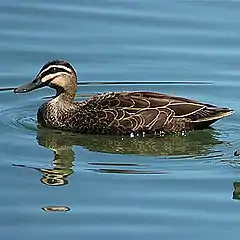
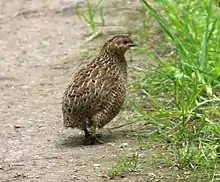
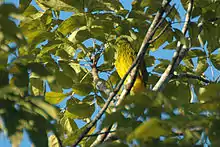
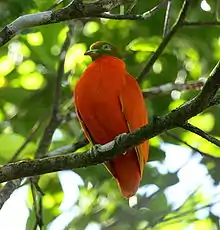
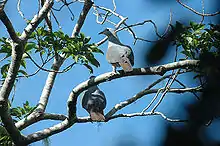
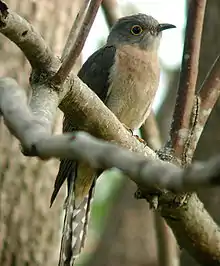
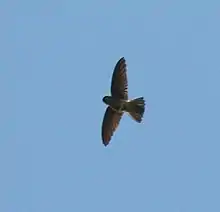
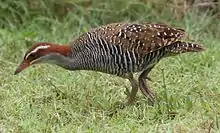
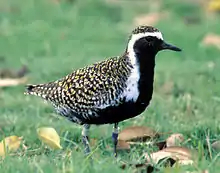
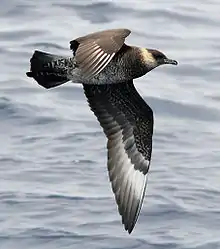
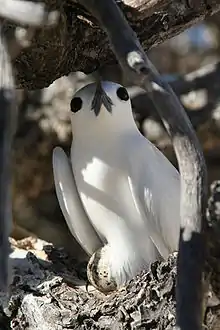
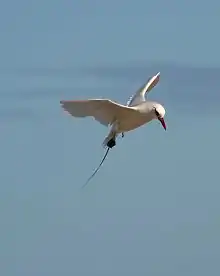
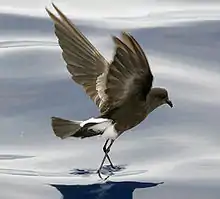
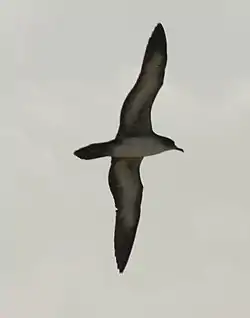
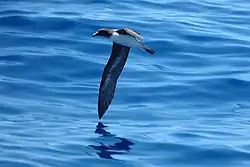
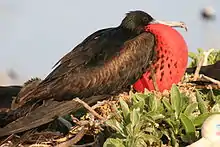
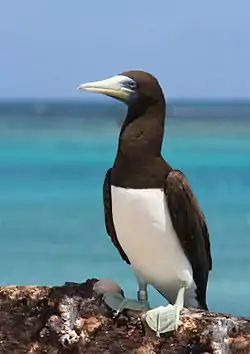
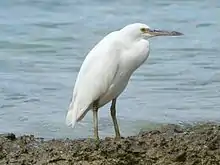

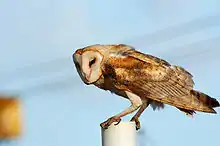
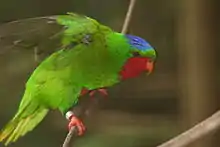
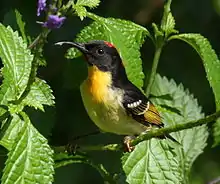
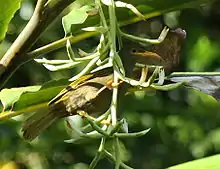
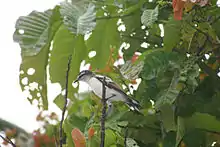
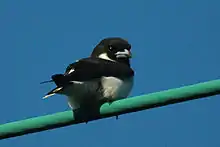
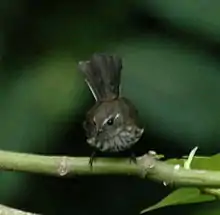
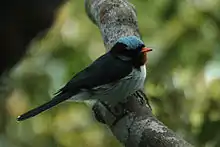
.jpg.webp)
